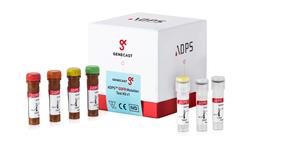On June 14, GENECAST, a specialist in liquid biopsy-based cancer diagnostics, announced that it will begin a clinical study for the early diagnosis of non-small cell lung cancer.
- Will it be possible to administer EGFR inhibitors to patients with early-stage non-small cell lung cancer (NSCLC)?
- The real possibility of the commercial use of liquid biopsies for patients with stage 1B-3A NSCLC has been confirmed.
SEOUL, Korea, June 14, 2021 (GLOBE NEWSWIRE) -- On June 14, GENECAST (CEO, SeungChan Baek), a specialist in liquid biopsy-based cancer diagnostics, announced that it will begin a clinical study for the early diagnosis of non-small cell lung cancer (NSCLC). The team will be led by Professor Jhingook Kim in the Lung and Esophageal Surgery Division within the Department of Thoracic Surgery at Samsung Medical Center.
This study evaluates whether the results of liquid biopsy-based EGFR testing with GENECAST's ADPS technology can represent the results of EGFR testing on tumor tissue DNA. This study is especially significant for identifying the clinical effects of liquid biopsies on early cancer detection, given that it involves early-stage cancer patients at the 1B to 3A clinical stages.
To date, the clinical effects of liquid biopsies applied to lung cancer patients have mostly been researched with a focus on lung cancer that has been systemically spread through blood. In other words, lung cancer containing a portion of multiple tumor cells in the blood. On other hand, little research has been done about the power to detect EGFR gene mutations before surgery in patients with lung cancer that is resectable due to the absence of lesions spread through blood. This is because carrying out this research is considerably difficult.
In recent years, active discussions have globally been under way over the possibility of researching the pre-surgical administration of EGFR inhibitors for resectable early-stage lung cancer. This is because the pre-surgical administration of EGFR inhibitors is expected to not only enable surgery by blocking the spread of tumors in early stages and reducing the size of tumors, but also increase the actual survival rate of patients. In addition, it is easier to administrate drugs before surgery. Using EGFR inhibitors should be preceded by the diagnosis of EGFR gene mutations, but traditional biopsies often involve high risks or are impossible due to the nature of sites of lung cancer.
If the clinical effects of liquid biopsies with ADPS technology prove that this diagnostic method can detect early-stage NSCLC, then it is expected that this will lead to more active research efforts on the administration of EGFR inhibitors in these early-stage patients.
GENECAST's chief technical officer (CTO) Byungchul Lee ph.D commented, "With the recent FDA approval of Osimertinib as an adjuvant therapy for early-stage NSCLC, the early diagnosis of this cancer using liquid biopsies is receiving attention again. If liquid biopsies can diagnose not only metastatic lung cancer, but also operatable early-stage lung cancer, then they are likely to improve the survival rates of NSCLC patients."
Professor Jhingook Kim, a specialist in lung cancer in the Department of Thoracic Surgery at Samsung Medical Center, expressed his expectations for this study: "The study is very significant in terms of identifying the effects of liquid biopsies on early-stage patients considering resective surgery for a complete recovery, not patients with systemic metastases. Depending on the study results, follow-up studies will likely be conducted on various topics such as the use of liquid biopsies in the early diagnosis of cancer.
# Overview of GENECAST
GENECAST is a specialist in liquid biopsy-based cancer diagnostics that analyze cancer genes. This company has achieved 0.01% of actual detection sensitivity and the highest sensitivity of 0.0001% through its own original technology called the Allele-Discriminating Priming System (ADPS). ADPS is a qPCR-based technology that provides simpler and faster testing than other liquid biopsy-based diagnostic methods. It enables the analysis of cancer genes in Stage 1 cancer patients by realizing the highest detection sensitivity available today. GENECAST is operating a range of businesses including precision medicine, LDT commercialization, and companion diagnostics based on ADPS technology, and is dedicated to the development of new technologies that can realize early diagnostics according to the type of cancer. More information can be found at www.igenecast.com.
Contact:
Soobin Shin
GENECAST Press Office
Tel: +82-2-2157-3151
E-mail: comm@genecast.co.kr
A photo accompanying this announcement is available at https://www.globenewswire.com/NewsRoom/AttachmentNg/96d91465-1699-41a3-89f2-6be43bf58df5






